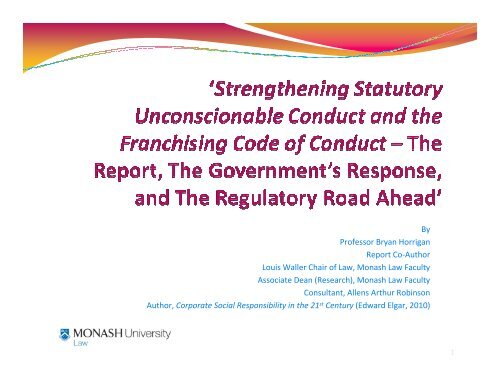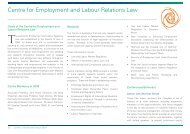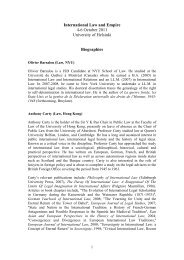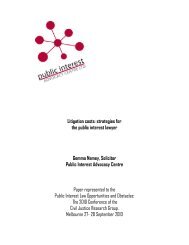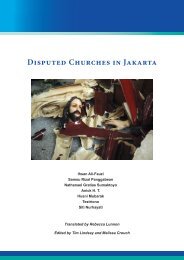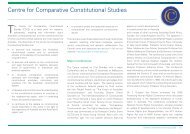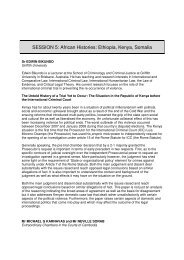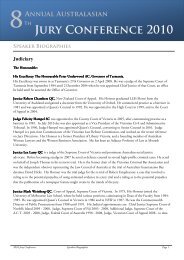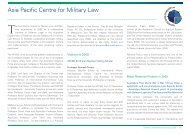By Professor Bryan Horrigan Report Co-Author Louis Waller Chair of ...
By Professor Bryan Horrigan Report Co-Author Louis Waller Chair of ...
By Professor Bryan Horrigan Report Co-Author Louis Waller Chair of ...
You also want an ePaper? Increase the reach of your titles
YUMPU automatically turns print PDFs into web optimized ePapers that Google loves.
Overview Lead-up to the Panel’s inquiry and appointment Focus and conduct <strong>of</strong> inquiry Outcomes <strong>of</strong> inquiry Government’s response Flow-on regulatory impact and work Lessons for lawyers Caveats up front2
Terms <strong>of</strong> Reference Clarifying role v ‘clean slate’ review <strong>of</strong> statutoryunconscionable conduct (ie unfinished business from previousgovernmental inquiries) Whether ‘a statement <strong>of</strong> principles concerning unconscionableconduct’ or ‘a list <strong>of</strong> examples that all parties agree constituteunconscionable conduct’ should be included in the TPA Whether Franchising <strong>Co</strong>de <strong>of</strong> <strong>Co</strong>nduct needs anything more toaddress five identified and potentially problematic franchisingbehaviours3
Why Another Public Inquiry? Previous Cth/State inquiries Pre-inquiry Government decisions <strong>Co</strong>rrelative regulatory reform (eg ACL) and changed regulatoryenforcement landscape (eg enhanced blend <strong>of</strong> Cth/State regulators) Some proposed ACL reforms already affect statutoryunconscionable conduct (eg non-court regulatory powers, penaltiesfor unconscionable conduct) Importance <strong>of</strong> TPA and FCC to big/small business regulation Emerging research on the franchising sector and its relevantindustry components (eg motor trades, petrol, retail leasing, foodfranchises etc)4
Focus and <strong>Co</strong>nduct <strong>of</strong> The Inquiry Framing the Terms <strong>of</strong> Reference Panel members (David Lieberman, Ray Steinwall, <strong>Bryan</strong> <strong>Horrigan</strong>) Working with two federal government departments (Treasury andDIISR) Internal government impact assessments and stakeholderconsultations Unconscionable conduct + 5 problematic franchising behaviours –connections Public issues paper + public submissions (including some lawyergroups) Panel consultations (eg ACCC, and ACCC’s Franchising advisorygroup) Importance <strong>of</strong> relevant legal and non-legal representative groups <strong>Co</strong>nfidential governmental and non-governmental submissions5
Unconscionability Relates to … Various equitable (and some common law) causes <strong>of</strong>action and bases for relief Statutory unconscionability under Trade Practices Act Statutory unconscionability under Fair Trading Acts Statutory unconscionability in financial services underASIC Act Unconscionable financial services licensee conduct under<strong>Co</strong>rporations Act Unjust contracts laws (eg some Fair Trading Acts, NSW<strong>Co</strong>ntracts Review Act) Related consumer credit laws Industry codes (eg Banking/Franchising <strong>Co</strong>des) State retail/commercial leasing laws6
Three Basic Forms <strong>of</strong> Statutory Unconscionability General prohibition on unconscionable conduct by corporations:- TPA s 51AA (in trade practices generally)- ASICA s 12CA (in financial services)- <strong>Co</strong>rporations Act s 991A (financial services licencees) Unconscionable conduct in retail/personal/consumer contexts:- TPA s 51AB- ASICA s 12CB- <strong>Co</strong>nsumer Credit <strong>Co</strong>de / <strong>Co</strong>ntracts Review Act (NSW) Unconscionable conduct in big/small business contexts:- TPA s 51AC- ASICA s 12CC- Some Fair Trading Acts- Some commercial/retail leasing Acts7
Unconscionability Under TPA s51AA & ASICA s12CA“A corporation must not, in trade or commerce, engage in conductthat is unconscionable within the meaning <strong>of</strong> the unwritten law, fromtime to time, <strong>of</strong> the States and Territories.”“A corporation must not, in trade or commerce, engage in conduct inrelation to financial services if the conduct is unconscionable withinthe meaning <strong>of</strong> the unwritten law, from time to time, <strong>of</strong> the Statesand Territories.”8
FSR Legislation & Unconscionability (s991A(1) CA)“A financial services licensee must not, in orin relation to the provision <strong>of</strong> a financialservice, engage in conduct that is, in all thecircumstances, unconscionable.”
Unconscionability Under TPA s51AB & ASICA s12CBTPA:“A corporation shall not, in trade or commerce, in connectionwith the supply [but not supply for purposes <strong>of</strong> re-supply orusing up / transforming in trade or commerce] .. <strong>of</strong> goods orservices [<strong>of</strong> a kind ordinarily acquired for personal, domestic,or household use or consumption] engage in conduct that is,in all the circumstances, unconscionable”ASICA: supply <strong>of</strong> financial services
Unconscionability Under TPA s51AC (cf s12CC ASIC Act)“A person/corp must not, in trade or commerce, inconnection with (a) the supply .. <strong>of</strong> goods or services to acorp/person (other than a listed corporation) [for purposes<strong>of</strong> trade or commerce] or (b) the acquisition or .. goods orservices from a corp/person (other than a listedcorporation) [for purposes <strong>of</strong> trade or commerce], engagein conduct that is, in all the circumstances,unconscionable.” (s51AC TPA)ASICA: supply <strong>of</strong> financial services
Unconscionability under TPA s51AB & AC& s12CB & CC ASIC Act – indicatorsParties’ relative bargaining strengthsWhether conditions extend beyond what is reasonably necessary to protectlegitimate interestsUnderstanding <strong>of</strong> the documentsAny undue influence, pressure, or unfair tactics by a party or someone acting ontheir behalf<strong>Co</strong>mparative prices and terms for availability <strong>of</strong> goods and services elsewhereSections 51AC & s12CC only: <strong>Co</strong>nsistent with treatment <strong>of</strong> similar parties/transactions <strong>Co</strong>mpliance with any relevant industry codes Unreasonable failure to disclose (i) intended conduct which might affect the otherparty’s interests and (ii) risks to the other party arising from that conduct whichreasonably they might not foresee Willingness to negotiate terms and conditions Whether parties act in good faith Whether contractual right exists to vary unilaterally a term or condition <strong>of</strong> acontract
Meanings & Levels <strong>of</strong> Unconscionability RegulationUnder ‘the Unwritten Law’ (4 categories as described by Paul Finn): [1] Unconscionability as the underlying concept for Equity as a whole [2] Unconscionability as an element or finding that is essential forspecific equitable/other actions (eg estoppel, relief against forfeiture,unconscionable dealings, unilateral mistake etc)- <strong>Co</strong>ercion/exploitation/advantage-taking- Unconscionable exercise <strong>of</strong> rights, retention <strong>of</strong> benefits etc [3] Doctrines & remedies associated with unconscionable dealings &exploitation, advantage-taking, and defective understanding:– ‘spousal guarantees’ rules (eg Yerkey v Jones, Garcia)– ‘special disadvantage’ rule (eg Amadio)– Others (eg Bridgewater v Leahy) [4] Unconscionability as a direct ground <strong>of</strong> relief in its own right,unmediated by conventional doctrines (eg Lenah Game Meats v ABC)13
Full Fed Ct in ACCC v Samton Holdings (2002) Unconscientious exploitation <strong>of</strong> a party’s special disadvantage(eg Amadio) Defective understanding, relationship <strong>of</strong> influence, and absence<strong>of</strong> independent explanation (eg Garcia) Unconscionable departure from previous representation (egestoppel – Verwayen, Waltons Stores v Maher) Relief against forfeiture and penalty (eg Legione v Hateley andStern v McArthur) Rescind contracts for unilateral mistake (eg Taylor v Johnson)14
Important High <strong>Co</strong>urt Instruction Affecting Statutory andNon-Statutory Interpretation Farah <strong>Co</strong>nstructions v Say-Dee [2007] HCA 22 at [135]:‘Intermediate appellate courts and trial judges in Australia shouldnot depart from decisions in intermediate appellate courts inanother jurisdiction on the interpretation <strong>of</strong> <strong>Co</strong>mmonwealthlegislation or uniform national legislation unless they are convincedthat the interpretation is plainly wrong. Since there is a commonlaw <strong>of</strong> Australia rather than <strong>of</strong> each Australian jurisdiction, thesame principle applies in relation to non-statutory law.’15
ACCC v CG Berbatis Holdings Pty Ltd [2000] FCA 1376 The [tenants] suffered what might be called a ‘situational’ asdistinct from a ‘constitutional’ disadvantage. That is to say itdid not stem from any inherent infirmity or weakness ordeficiency. It arose out <strong>of</strong> the intersection <strong>of</strong> the legal andcommercial circumstances in which they found themselves.That disadvantage, not being constitutional in character, wasnot able to be mitigated by the fact <strong>of</strong> legal representationwhich they had available to them at all material times.
Unconscionable <strong>Co</strong>nduct Senate Economics <strong>Co</strong>mmittee outcomes Government’s response Implications <strong>of</strong> TPA reforms for ASIC Act andcognate state laws on statutory unconscionableconduct Pros and cons <strong>of</strong> legislated examples Different kinds <strong>of</strong> principles Pros and cons <strong>of</strong> different kinds <strong>of</strong> principles17
Recommendation on Examples ‘In many circumstances, statutory unconscionable conduct canbe difficult for stakeholders to understand and for the courtsto apply, which contributes to a lack <strong>of</strong> certainty andconfidence surrounding the effect <strong>of</strong> the provisions.’ ‘A list <strong>of</strong> examples will not improve understanding orimplementation <strong>of</strong> the provisions.’ Scope for the ACCC, ASIC, and state regulators under a singlenational law on statutory unconscionable conduct (ie ACL) toinclude examples and other guidance.18
Recommendation on Principles ‘Interpretative principles, as an aid to interpretation <strong>of</strong> theprovisions, would assist the courts in interpreting theprovisions, stakeholders in understanding them, andregulators in enforcing them.’ ‘The principles should recognise that section 51AC (and,arguably, section 51AB) <strong>of</strong> the TPA and equivalent provisions<strong>of</strong> the ASIC Act are intended to go beyond the scope <strong>of</strong> theequitable and common law doctrines <strong>of</strong> unconscionability, andare not confined by them.’19
Recommendation <strong>of</strong> Principles <strong>of</strong> Interpretation Sections 51AB and 51AC go beyond common law and equityAND not limited by them Apply to terms and progress <strong>of</strong> a contract – ie not just whathappens at execution Apply to systems/patterns <strong>of</strong> business behaviour – ie not justparticular incidents Amadio-like special disadvantage not needed to access thestatutory provisions/remedies20
Other Unconscionability-Related Reforms Harmonisation <strong>of</strong> sections 51AB and 51Ac to be considered byGovernment Given single national ACL + increased regulatory enforcementpowers, need for uniform national regulatory guidance by ACCC,ASIC, and state regulators on statutory unconscionable conduct(similar to proposals under unfair contracts regime) Nature <strong>of</strong> the regulatory guidance on unconscionable conduct Regulators to bring more test cases on the interpretative principlesand other reforms Non-government test case support/encouragement too (see lateradvocacy, pro bono, and research recommendations)21
Five Identified Franchising Behaviours Unilateral variation (eg via operations manual) Unforeseen capital expenditure End-<strong>of</strong>-term changes/arrangements Attribution <strong>of</strong> legal costs <strong>Co</strong>nfidentiality agreements22
Getting the Right Balance Availability <strong>of</strong> evidence/expertise Availability <strong>of</strong> sample clauses <strong>Co</strong>nnection between identified behaviours Spectrum <strong>of</strong> cost recovery circumstances Spectrum <strong>of</strong> regulatory options: Absolute ban <strong>Co</strong>ntingent ban <strong>Co</strong>mpensation/consultation right Structure for opening/closing relationships Benefits/limits <strong>of</strong> enhanced disclosure23
Other Franchising Matters Additional ‘Plain English’ up front disclosure document Treatment <strong>of</strong> ‘Good Faith’ ACCC’s function as regulator v mediator Need for Cth/State governmental attention to wider issue <strong>of</strong>mechanisms for early dispute resolution intervention Attribution <strong>of</strong> legal costs to be examined more extensivelywithin that review process Government and ACCC to work with franchising sector todevelop better education, training, and research onfranchising24
Research, Advocacy, and Pro Bono Work Pro bono legal work to support further research, advocacy,and test cases for small business on both statutoryunconscionability and franchising Alignment with existing government policies and processes onpro bono work by lawyers and consumer research andadvocacy Evidence-based research needed to inform next review <strong>of</strong>these reforms and all other recent TPA/FCC changes Allow period <strong>of</strong> 3-5 years for current changes (including thosearising from the Panel’s <strong>Report</strong> to take effect25
Some Lessons for Lawyers in All Arms <strong>of</strong> the Pr<strong>of</strong>essionSolutions to most major regulatory problems require more than doctrinal legal skills andknowledgeSignificance <strong>of</strong> representative bodies as stakeholders in legal regulatory reform process andassistance to themRealities and sophistication <strong>of</strong> the policy and reform development processImportance <strong>of</strong> legal submissions to public inquiries:Influencing the ‘rules <strong>of</strong> the game’ for big/small businessPractical legal expertise beyond governmental expertiseInsights into problems/traps beyond governmental expertiseMeaningful examples <strong>of</strong> clauses/practices/safeguards<strong>Co</strong>nnections to CSR, pro bono, government procurement, business regulation impact,and other ‘business case’ issues for lawyers as client services providersNon-submission and post-submission complacency trapsNon-submission avenues <strong>of</strong> influenceSignificance <strong>of</strong> legal/public commentary/analysisInsights on the internal governmental processes for major reformsGap between research needs <strong>of</strong> one arm <strong>of</strong> government and what other arms <strong>of</strong> governmentrecognise in research funding/rankings26
Future Regulatory Guidance, Advice, and ‘Test Case’ LitigationFlow-through impact <strong>of</strong> everything in the context <strong>of</strong> a changed regulatory landscape:Pre-report governmental decisions to reform statutory unconscionable conduct and FCCOne single national law on statutory unconscionable conductEnhanced regulatory powers (eg infringement notices)Recent ACCC/ASIC court wins and renewed impetus for test cases Ongoing test cases on scope <strong>of</strong> statutory unconscionability in other contexts (eg share margin calls –Goodridge case)Framing regulatory guidance beyond decided casesPotential harmonisation and impact <strong>of</strong> business/consumer provisions on unconscionable conductFurther judicial rationalisation <strong>of</strong> unconscionability doctrines (flagged by French J in Berbatis)Academic/judicial development <strong>of</strong> framework for statutory unconscionable conduct transcending existingnon-statutory bases for reliefUnresolved legal questions for ‘test case’ advice/litigation about:Spread <strong>of</strong> unconscionability doctrines across ss51AA-51ACStatutory extensions beyond those doctrinesApplication <strong>of</strong> ‘special disadvantage’ to B2B contexts (eg Bell Group v Westpac and Optus v Telstralitigation)Existence, scope, and application <strong>of</strong> ‘situational’ forms <strong>of</strong> special disadvantageMeaning, scope, and application <strong>of</strong> good faith as an indicator <strong>of</strong> statutory unconscionabilityInteraction with ongoing academic/judicial disputes about the content and tests for good faith undercontract law27


